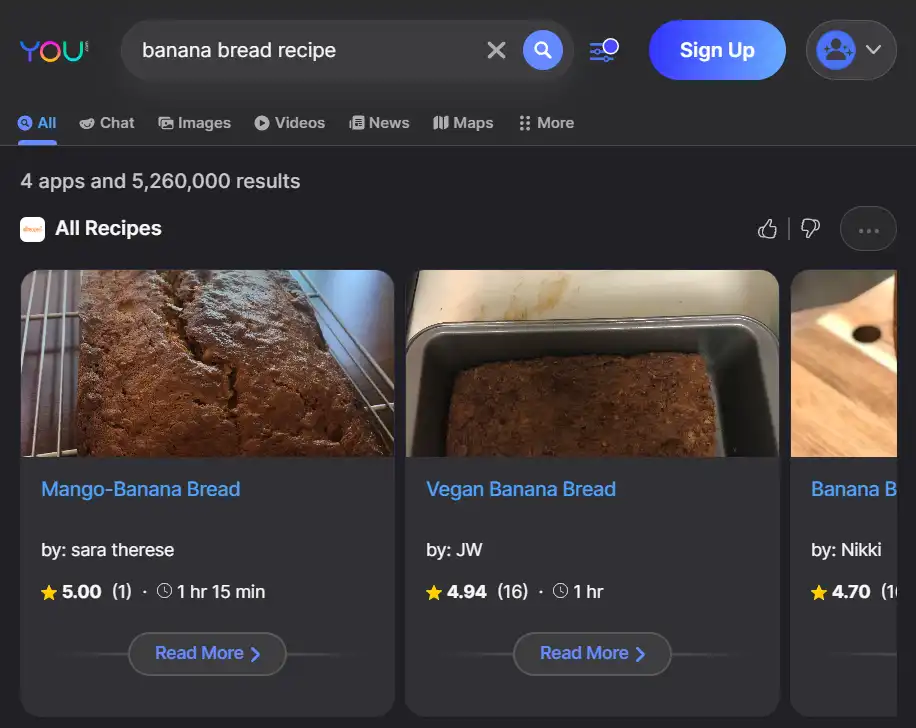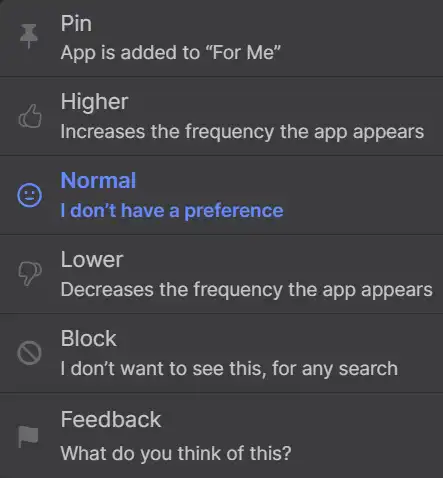Feature breakdown: You.com search engine apps
With the recent news from Microsoft and Google, the integration of AI into search engines has generated a lot of discussion. I recently discovered You.com, a search engine startup with several AI-oriented products. Their flagship product is a search engine for software developers.
One thing that stood out to me was how additional functionality is integrated into the search results. In this post, I'll be describing You.com's apps feature and thinking through some of the UX and product design implications.
What exactly are apps on You.com?
Apps are components that can display search results or generate content directly in the results feed. At first, I thought the name app referred to web apps, but these apps have separate functionality and have been built by the You.com team.
Site structure
When first looking at the results feed, you'll notice that the list of results can be scrolled through on both vertical and horizontal axes. At first glance, the horizontal list of cards appears to be quite similar to Google's featured links.


However, the You.com apps have additional features, including:
Website interactions from within the search feed
For some sites, you'll be able to view the most relevant content from the page within the search feed. Moreover, you can interact with the site from the app. For example, if you sign in to the Twitter app, you can follow, retweet, or favorite a tweet without leaving the search results page.

Apps aren't just for websites, though. There's also:
AI widgets
AI interactions are available within the search feed, with features like code generation (YouCode), text generation (YouWrite), and an AI chatbot (YouChat).
The ability to vote and pin
It's possible to express preferences for the apps you'd like to see through upvotes, downvotes, pinning, or blocking. These preferences will personalize the search results that populate your feed. However, pinned apps aren't always at the very top of the results.

Apps won't show up if they're not relevant to your search. Thankfully, my "banana bread recipe" query didn't include results from Stack Overflow.
Apps from a user perspective
A caveat for this section
This isn't a criticism of the You.com product team. I'm not privy to all of the factors that affect business and product strategy decisions. However, all product features have pros and cons, and it's useful to consider what those might be as a thought experiment.
Keeping in mind that the target audience for You.com is software developers, a few pros and cons for apps come to mind.
Pros for users
- Speed: It's faster to find information and access site features without having to actually click into the website.
- Reduced context switching: Workflow friction is lowered by combining complementary features into one feed.
- Saved search preferences: By pinning useful apps, users know their favorite sites will show up in the feed without effort.
Cons for users
- Complexity: Streamlined tools like Author have found popularity because of the way they reduce mental overhead. The You.com search engine is a different kind of tool, but some might not enjoy the way features are visually integrated.
- Apps have different functions: As noted above, each item in an app listing could include an interaction, an AI widget, or simply be a link. Users could end up with a muddled mental model of what exactly apps are.
- Potential inaccuracy of AI-based apps: There are many examples of AI chatbots giving out erroneous information, which erodes trust in the product.
You.com apps from a product perspective
Let's examine the pros and cons of the app features from the perspective of product strategy as well.
Pros for the product
- Centrality: A lot of functionality is included, increasing the likelihood that a user will stay on the site longer.
- Appealing to target audience: When the Stack Overflow and YouCode apps are visibly embedded within search results, it's easy to see their utility.
- Fresh and exciting: It's been some time since search engines have seen true innovation, and apps feel like a preview of what's coming.
- Leaves the door open to add more functionality: Apps are currently based around websites or AI tools, but it's easy to envision more kinds of tools entering this space (something like a Todoist widget comes to mind).
Cons for the product
- Lots of development work required: Since the You.com team is creating most of the apps (so far), it has to be a lot of work to create and maintain apps for so many websites, web applications, and AI-tools.
- Lack of incentive for sites to develop their own apps: By keeping the user in one central location, websites could take a hit in page views. Without additional incentives, I think they're unlikely to put effort into something that could harm their own business model.
- Inertia: One consequence of novelty is that people may be inclined to stick with something they better know and understand.
Conclusion
I've used You.com and its apps for help with coding, and I've found it to have utility for the use case of quickly finding answers to questions and generating snippets of code that clarify concepts.
The search engine is a staple of the internet, and changes to them have far-reaching implications. It's a risk for a product's value proposition to rely on novel forms of technology. While there's much debate about the role that AI will play in shaping the next generation of technology, there's no doubt we'll be hearing about it for a long time to come.